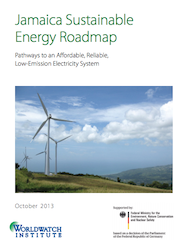The Worldwatch Institute has released the report, “Jamaica Sustainable Energy Roadmap: Pathways to an Affordable, Reliable, Low-Emission Electricity System,” that looks at the measures that the Jamaican government can take to transition its electricity sector to one that is socially, environmentally and financially sustainable. The report also analyzes the potential for energy efficiency and renewable energy deployment in Jamaica and discusses the social and economic impacts of alternative energy pathways, concluding that a scenario of high renewable penetration can bring significant savings, greater energy security, gains in competitiveness, and many other important benefits to the country.
 “Jamaica is paying a colossal price to import polluting and health-threatening fossil fuels, even when it has the best clean energy resources at its doorstep: wind, solar, hydro, and biomass,” said Alexander Ochs, Director of Climate and Energy at Worldwatch and a co-author of the study. “The Jamaican government has set a nationwide goal of 20 percent renewable energy use by 2030; our Roadmap will help to realize this goal. What’s more, our analysis shows that the bar can and should be set much higher: Jamaica can become a zero-carbon island in a matter of decades, and its people would benefit enormously from such a transition.”
“Jamaica is paying a colossal price to import polluting and health-threatening fossil fuels, even when it has the best clean energy resources at its doorstep: wind, solar, hydro, and biomass,” said Alexander Ochs, Director of Climate and Energy at Worldwatch and a co-author of the study. “The Jamaican government has set a nationwide goal of 20 percent renewable energy use by 2030; our Roadmap will help to realize this goal. What’s more, our analysis shows that the bar can and should be set much higher: Jamaica can become a zero-carbon island in a matter of decades, and its people would benefit enormously from such a transition.”
Worldwatch collaborated closely on this project with the Government of Jamaica. “I am very confident that the outcome of this project will enable Jamaica to map, in more precise ways, the additional electricity generation capacity that we seek,” says Jamaican Energy Minister Philip Paulwell. “We intend to use the Roadmap to determine the next phase of new generation capacity, and it will enable us to be far more efficient than we have in the past.”
Jose Maria Figueres, president of the Carbon War Room and former president of Costa Rica, points to the broader benefits of the study and Worldwatch’s Sustainable Energy Roadmap work: “This report provides the practical steps that enable us to fast-forward the deployment of renewable energy. With it, we can boost national economies and improve conditions of well-being. [Jamaica] can become a shining example of what the future is all about.”
The Roadmap also delves into the full societal costs of Jamaica’s current electricity sector to the costs of alternative pathways that are based on high shares of domestic renewable energy. The report concludes that Jamaica will benefit economically, socially, and environmentally if it relies more heavily on renewable energy sources and less on fossil fuels. In addition, based on analysis of Jamaica’s investment environment, the Roadmap suggests regulatory and institutional changes that will be necessary to attract new investments in clean energy solutions.

